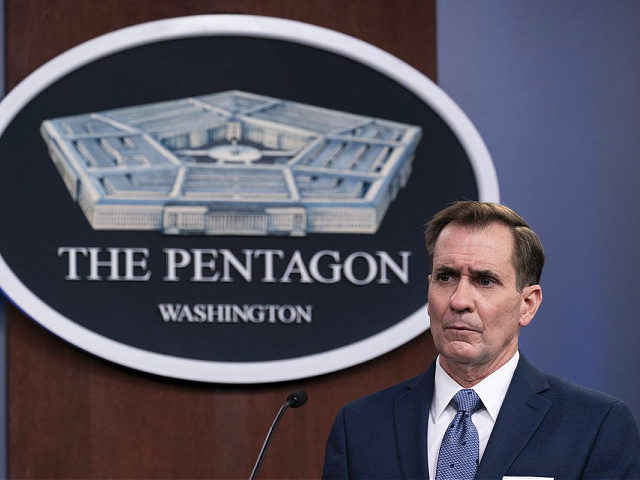The Pentagon called the most recent rocket attacks on an Iraqi base where U.S. forces are stationed “a troubling development” but said there is no desire for escalation.
“Certainly, this is a troubling development and not what anybody wanted to see, no question about it,” Pentagon Press Secretary John Kirby said about the attacks. He confirmed that an American contractor sheltering in place from the attacks suffered a heart attack and died.
He said Iraqi authorities are investigating the attacks and said, “if there is a need to further respond, we will do that … in a manner of our own choosing.”
He added, “Nobody wants to see the situation escalate.”
The Biden administration may now be on the verge of a military tit-for-tat with Iranian-backed Shia militia in Iraq who have now conducted at least three rocket attacks on bases where U.S. troops and contractors are based.
The first rocket attack came on February 15. Fourteen 107mm rockets launched at Erbil Air Base, killing one non-U.S. contractor and injuring nine, including an American service member and four American contractors.
KRG are leading investigation. Further information will be released as it becomes available.
— OIR Spokesman Col. Wayne Marotto (@OIRSpox) February 16, 2021
Then, on February 22, two rockets fell in the Green Zone in Baghdad, Iraq — where the U.S. Embassy is based. There were no casualties.
.@SecMedCell reports that two rockets fell on the Green Zone w/o causing casualties at 1925 Baghdad time. @CJTFOIR reports no damages or injuries. For updates see @SecMedCell https://t.co/7bx0qeRztn
— OIR Spokesman Col. Wayne Marotto (@OIRSpox) February 22, 2021
As pressure mounted on President Joe Biden to respond, the administration refrained from attributing the source of the attacks and said Iraqis were investigating them with assistance from the U.S.
Three days later, on February 25, President Joe Biden authorized airstrikes in Syria, hitting nine structures that were being used by the Iran-backed Shia militia groups believed to have carried out the rocket attacks in Iraq.
The Pentagon said the next day the airstrikes sent an “unambiguous, clear message to anyone in the region about what the stakes are if you’re going to continue to conduct attacks on our people.”
The airstrikes were also meant to deter future attacks, Kirby said. He said:
Our desire was to remove [the facilities] from their inventory and to send a strong message about future attacks. Clearly, we want there to be a deterrence message here delivered straight to them about the repercussions of going after our people and our Iraqi partners and our facilities inside Iraq. Now, we’ll have to see. But that was the intent.
However, on March 3, there were more rocket attacks on an Iraqi base hosting U.S. troops.
10 Indirect Fire rockets and Iraqi Security Forces are investigating.
— OIR Spokesman Col. Wayne Marotto (@OIRSpox) March 3, 2021
Kirby acknowledged the U.S. strikes were intended to send a signal about “how seriously we take our responsibilities to protect our people.”
Although the Pentagon is not yet directly attributing the latest rocket attacks for the American contractor’s death, they raise the question of whether the Biden administration’s response was adequate and how it may now respond — particularly as it seeks to enter a nuclear negotiation with Iran.
Politico reported that Biden chose the “middle option” from a broad range of military options.
Republicans in Congress slammed Biden’s response as inadequate.
“Iran did not get the message that harming Americans will have consequences. The mullahs in Tehran will not stop until they’re held directly responsible for American deaths at the hands of Iran-backed militias,” Rep. Mike Waltz, a National Guard colonel and Green Beret tweeted.
Iran did not get the message that harming Americans will have consequences. The mullahs in Tehran will not stop until they're held directly responsible for American deaths at the hands of Iran-backed militias. https://t.co/PKRfNmKCCd
— Rep. Mike Waltz (@michaelgwaltz) March 4, 2021
Sen. Bill Hagarty (R-TN), former U.S. ambassador to Japan under the Trump administration, argued the rocket attacks showed that Biden needed to maintain economic sanctions on Iran, not seek to relieve them in pursuit of a nuclear deal.
“Yesterday, another rocket attack in Iraq, with all the hallmarks of the Iran-backed militias, resulted in the death of an American. The Iranian regime seems intent on attacking Americans at the same time the Biden admin wants to give Tehran sanctions relief,” Hagarty tweeted.
“Yesterday’s attack is an example of why it is crucial not to relieve sanctions pressure on the Iranian regime unless the regime ceases its terrorism and other threats to Americans,” he added.
Yesterday’s attack is an example of why it is crucial not to relieve sanctions pressure on the Iranian regime unless the regime ceases its terrorism and other threats to Americans.
— Senator Bill Hagerty (@SenatorHagerty) March 4, 2021
Kirby said Wednesday he still hoped that the U.S. airstrikes would have a “deterrent effect” and declined to say what could come next.
“Nobody wants to see this escalate into, as you described it, a tit-for-tat. That’s not in our interest. It’s not in the Iraqi people’s interest,” he said.
Kirby avoided pointing the finger at who could be behind the rocket attacks but acknowledged that the rocket attacks “coincides with our past experience” with past attacks from Iranian-backed Shia militia groups, although he called them “Shia-backed militia.”
Follow Breitbart News’s Kristina Wong on Twitter or on Facebook.

COMMENTS
Please let us know if you're having issues with commenting.